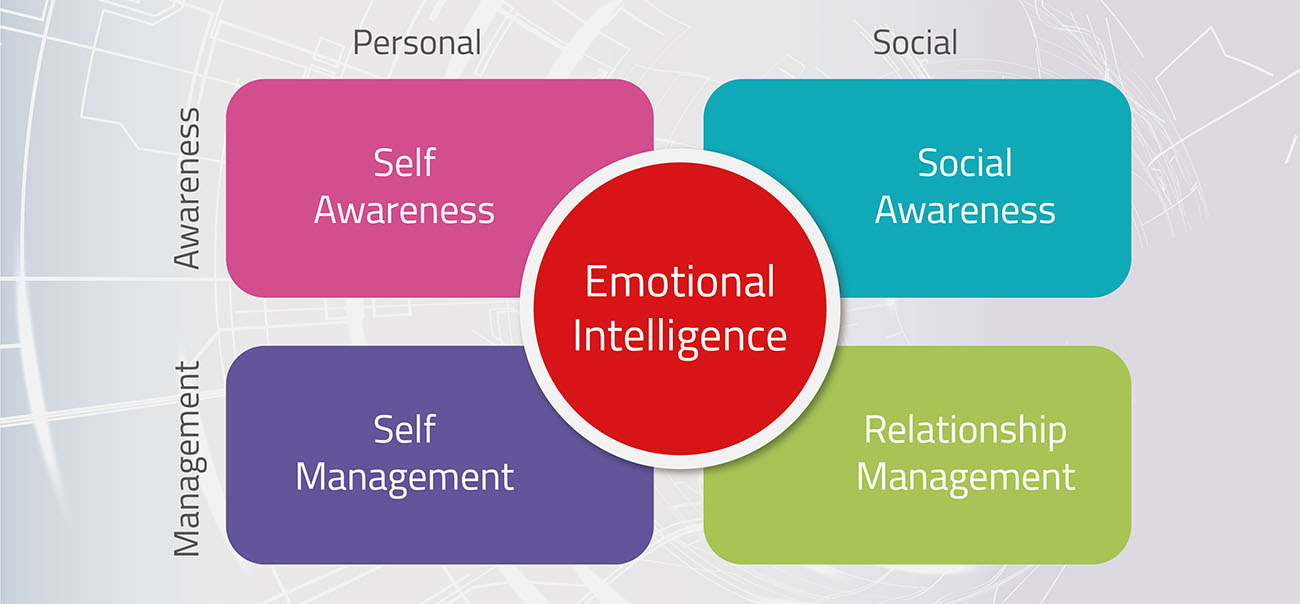Emotional & social intelligence (ESI) competencies are job skills that can, and indeed must, be learned. An underlying EI ability is necessary, though not sufficient, to manifest competence in any one of the four EI domains or clusters (Goleman 2000). The competencies are classified into four clusters of distinct areas of ability:
1. Self-awareness
2. Self-management
3. Social awareness
4. Relationship management
Nested within each of those four areas are specific, learned competencies that set the best leaders and performers apart from the average (see Figure 1). The framework illustrates, for example, that we cannot demonstrate the competencies of trustworthiness and conscientiousness without mastery of the fundamental ability of self-management, or the competencies of influence, communication, and conflict management, without a handle on managing relationships.

Figure 1: Goleman’s Emotional & Social Intelligence (ESI) Framework
Self-awareness concerns knowing one’s internal states, preferences, resources, and intuitions. Th¬e self-awareness cluster contains three competencies:
- Emotional self-awareness: recognizing one’s emotions and their effects
- Accurate self-assessment: knowing one’s strengths and limits
- Self-confidence: a strong sense of one’s self-worth and capabilities
Self-management refers to managing one’s internal states, impulses, and resources. The self-management cluster contains six competencies:
- Emotional self-control: keeping disruptive emotions and impulses in check
- Transparency: maintaining integrity and acting congruently with one’s values
- Adaptability: Flexibility in handling change
- Achievement: striving to improve or meet a standard of excellence
- Initiative: readiness to act on opportunities
- Optimism: persistence in pursuing goals despite obstacles and setbacks
Social awareness refers to how people handle relationships and awareness of others’ feelings, needs, and concerns. The social awareness cluster contains three competencies:
- Empathy: Sensing others’ feelings and perspectives and taking an active interest in their concerns
- Organizational awareness: reading a group’s emotional currents and power relationships
- Service orientation: anticipating, recognizing, and meeting customers’ needs
Relationship management concerns the skill or adeptness at inducing desirable responses in others. The relationship management cluster contains six competencies:
- Developing others: sensing others’ development needs and bolstering their abilities
- Inspirational leadership: inspiring and guiding individuals and groups
- Change catalyst: initiating or managing change
- Influence: wielding effective tactics for persuasion
- Conflict management: negotiating and resolving disagreements
- Teamwork and collaboration: working with others toward shared goals; creating group synergy in pursuing collective goals
Reference: Sattar Bawany (2023), Leadership in Disruptive Times: Negotiating the New Balance. Business Expert Press (BEP) LLC, New York, NY. Abstract available at: https://www.disruptiveleadership.institute/second-edition-book/

